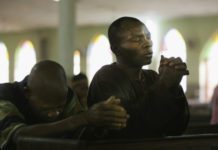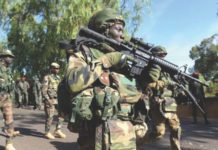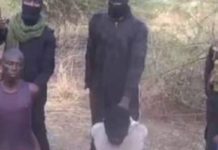By BosNewsLife Africa Service

BANGUI, CENTRAL AFRICAN REPUBLIC (BosNewsLife)– The United Nations has formally taken over peacekeeping operations in the Central African Republic (CAR) after renewed violence left scores dead, including two evangelical pastors.
Pastors Thomas Ouanam, 60, and Pierre Bapteme, 46, were killed in two separate attacks blamed on Séléka, a mainly Muslim alliance of rebel militia who overthrew the government last year.
It was unclear Wednesday, September 17, when and if the UN force will be able to end bloodshed that has rocked CAR’s devoted Christian community. In one of the latest anti-Christian incidents, Pastor Quanam, of the Evangelical Church of Brethren, was killed September 2 when armed men stormed the northern town of Nana Bakassa, Christians said.
The attackers reportedly arrived on motorbikes, looting properties for some five hours before leaving the town, local Christians told World Watch Monitor, the agency of advocacy and aid group Open Doors.
Three other people were killed while others took refuge in the bush or in surrounding towns such as Bossangoa, Christians said. Ouanam is survived by a wife and four children.
MORE VIOLENCE
In the second attack on September 8, Bapteme, a deacon and three choir members were shot dead in the compound of Elim Church, at Ngakogbo, 70 kilometres (43 miles) from Bambari, which was engulfed by deadly clashes in July and August.
Bapteme leaves behind a wife and four children.
More than 100 people were also killed – some by gunfire and others by machetes — forcing villagers to flee into the bush in search of safety, Christians said.
Pastor Lucien Imbi of Apostolic Church, who was injured, said the troubles began September 6 when Fulani herdsmen, supported by Séléka rebels, clashed with militiamen. The militiamen, known as ‘anti-Balaka’, killed four Fulani fighters, he explained. Séléka reportedly retaliated against the Christian population.
“When Séléka arrived around 12.30 [September 8] we hid at Elim Church,” Imbi added in published remarks. “To our surprise, three Séléka elements broke into the church and forced us to come out [and] asked each of us to state our identity.”
PASTORS ATTACKED
The fighters, he said, “took us, one after the other” asking ‘What should we do with pastors when ours are killed by your brothers anti-Balaka?’”
When they started to shouting, “I fell on the ground. It was then I realized a bullet hit my left arm,” Imbi added.
He claimed Séléka “waited for a while to ensure that we were really dead before leaving.” The pastor added that he crawled, “with great pain” to home, “leaving the lifeless bodies of Pastor Bapteme and four members” behind. Imbi was hospitalized, but said his injuries are not life threatening.
In a reaction, the Alliance of Evangelicals in Central Africa condemned the killings and expressed concern over the “scenes of killings organized by the armed gangs, for unknown motives, and perpetrated mainly against places of worship, ecclesiastical leaders and church members.”
The deployment of United Nations troops has received a cautious welcome from advocacy group Amnesty International.
COSMETIC CHANGE?
“The switch from AU to U.N. peacekeepers must be more than a cosmetic change, the swapping green berets for blue helmets. Instead, it must serve as a fresh start for the peacekeeping operation in CAR,” said Steve Cockburn, Amnesty’s deputy director of West and Central Africa.
Claude Cafardy, Deputy Head of Mission in the CAR for Doctors Without Borders, sounded more pessimistic.
“It seems that forces will look different. But right now, we are not confident [in] their efficiency in the coming months in CAR,” Cafardy added.
Open Doors seemed to agree. “Since independence in 1960, about ten peacekeeping missions have been deployed in CAR, and so far have failed to bring a lasting stability in the country”, including among Christians.








